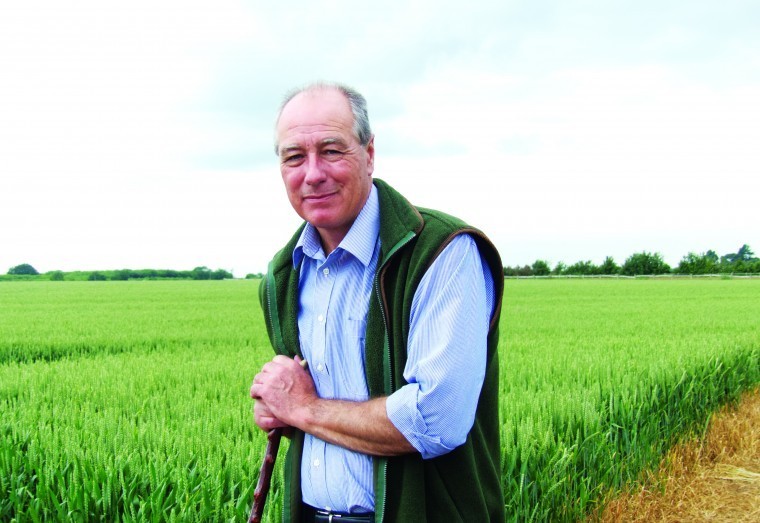As I said last month with the exception of the winter beans which we finally resorted to ploughing in, I am fairly sure we have given up on any more winter crop drilling. When we next see dry weather, which no doubt means cold, the matter can be reviewed properly.
So to the crops in the ground. Oilseed is rampant with lush strong growth. Disease is easy to find with temperatures still too high for Kerb treatments. As the wind has made spraying difficult the decision to spray just with a fungicide and wait for lower temperatures for the Kerb has yet to be tested.
One thing that remains in my memory is the appearance of black grass in oilseed rape crops as the efficacy of Kerb falls away in the spring following early application in mild autumns and that is a big factor to consider with current grass weed challenges. I suppose the matter of getting Kerb on before the end of January is also a concern but less so in November. Until lower temperatures arrive we will stick with fungicides only on oilseed crops if we get spraying days. Growth regulation is an issue with the conditions but in north Kent either pigeons will arrive with a vengeance or a keen north wind. Either way growth will be regulated and if it is not then we can certainly deal with that in the spring.
Wheat is also growing strongly with crops filling the rows and early ones tillering strongly. Growth is outstripping slug damage and there is much to be thankful for this autumn after the start to drilling that the South East suffered. There is a down side and that is grass weed control. It is difficult to understand the poor results as we have had plenty of moisture and on the whole applied timely residual sprays at high water volumes with angled nozzles to rolled seed beds.
Where we knew high pressure existed with seed return in the current year or historically we have spread Avadex in as timely fashion as we could, succeeding most of the time. Yet we still have more black grass than we should – not enough to spray wheat off but enough to be over spraying with contacts and topping up residuals. The strong wheat growth should at least provide competition which is much talked about by technical advisers and manufacturers. Rarely in my experience does it seem to make much difference in autumn crops.
The final challenge for cereals this autumn has to be barley yellow dwarf virus and aphid control. It has certainly been mild enough for an ongoing risk and rapid growth will have lessened the persistency of Deter seed dressings. This is far from a precise science even with monitoring traps across the country: it seems important to treat whenever conditions allow, not just second wheats that went in without Deter dressings but also first wheats. Quite a challenge with wet windy conditions.
Winter beans are more difficult in terms of herbicides as the warm ground conditions are promoting rapid germination and emergence so the luxury of waiting to apply Kerb with other residuals is not an option and we have had to treat drilled and ploughed crops as soon as we can.
Finally as I look round our fields I cannot help but notice the hedgerow growth that has not been cut field and roadside. No doubt the roads will be done in due course but many field sides will be waiting until next September when they will be a challenge in terms of growth and of course timing again. It seems as if the RSPB has achieved its aim of making hedgerow maintenance that difficult that many hedges will no longer be routinely cut.
We did apply for the August derogation for fields going into oilseed but when it rained did not have the nerve to cut them, fearing the possible penalties if inspected and drilling had not been completed. The wet weather made cutting pre drilling of first wheats impossible without marking seed beds. The outcome was that we managed to only cut hedges where second wheats and spring crops were planned. If this follows through in subsequent years of basic payment scheme regulations many years of hedge maintenance will be undone.
A total lack of pragmatism by DEFRA and the Rural Payments Agency on the matter seems to lead us in the direction that practical farming is not a consideration, just interpreting and enforcing the rules. I think the only way to challenge this particular piece of idiocy is for one of the farming lobbying organisations to commission some proper research to challenge the RSPB version that August nesting hedgerow birds contribute anything of value to end of season bird numbers. Without that I believe we are stuck with the current situation going forward.
There seems to be a similar obstructive attitude to any changes to the three crop rule, mainly in Europe, with the situation unlikely to change until the next full review of the common agricultural policy when it will probably be so established that any change will bring an outcry from the environmental NGOs. I could go on and look at the new countryside stewardship scheme which appears to be undermining participation by farmers, defeating not just the objective of having a scheme but the work done over past years. We only have one farm left in the entry level schme and when that finishes in February 2016 that will be an end to the matter. As these issues continue to accumulate on one side we have a government promising a strategic plan for the industry and food production on the other. I am not sure there is a middle ground with a compatible way forward.




